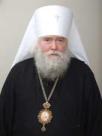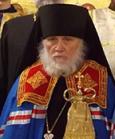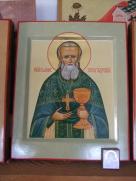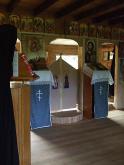Monday, July 6, 2015
Vladimir Icon of the Mother of God
![]()
O all-merciful Mistress Theotokos,
heavenly Queen, all-powerful Protectress,
our hope which is never put to shame.
We thank Thee for all Thy benefactions to the Russian people
from ancient times until today,
revealed through Thy wonderworking Icon!
And now, most good Mistress, look upon us,
Thy sinful and unworthy servants, show us Thy mercy and pray
to Thy Son, Christ our God, that we may be freed from all evil.
Protect and grant wisdom to the pastors of the Church,
that they may worthily shepherd the flock of Christ,
and rightly divide the Word of Truth!
Send down Thy holy blessing on all Orthodox Christians,
who venerate Thee and pray to Thee before Thy wonderworking Icon!
Standing before the throne of the Most High God,
be our Protectress and Intercessor!
For who shall we run to, if not to Thee, Mistress;
to whom shall we bring our tears and sighing,
if not to Thee, Most-Holy Theotokos;
for we have not other help, we have no other hope,
apart from Thee, Heavenly Queen.
We run to Thy protection,
by Thy prayers send down upon us peace, health,
abundant fruits of the earth, favourable weather,
save us from all misfortunes and sorrows, from disability and illness,
from sudden death, from all evil,
and from enemies visible and invisible.
Grant us wisdom and instruct us, O all-merciful Intercessor,
teach us how to traverse the path of this earthly life without sin:
For Thou knowest our weakness, Thou knowest our sins,
but Thou also knowest our faith, and seest our hope:
Grant us correction of our sinful life, and soften our evil hearts.
Strengthen us in the true faith,
put in our hearts the spirit of fear of God,
the spirit of piety, the spirit of humility, patience and love,
persistence in good deeds:
Free us, then, from temptation
from disastrous soul-destroying teachings,
from lack of faith, from moral decay and eternal perdition.
For we beseech Thee, most-pure Mistress,
and falling down before Thy holy Icon, we pray:
Have pity and mercy on us,
and in the terrifying judgement day,
by Thy help and intercession,
enable us to stand on the right hand side of Thy Son, Christ our God,
to Whom is due all glory, honour and worship,
with His Unoriginate Father,
and the All-Holy, Good and Co-essential Spirit,
now and ever, and unto the ages of ages.
Amen.
Adapted from an old Russian prayer book (Shanghai, 1938)
Sunday, March 29, 2015
Sixth Week of the Great Fast
The fast is nearing its end. Our inner gaze is turned toward Palm Sunday and the coming of the Lord:
Beginning the sixth week of the honourable fast with eagerness, let us sing to the Lord a pre-festal hymn, bringing palms, O ye faithful, to the One Who comes in glory to Jerusalem, with the power of Divinity to destroy death. Therefore let us piously prepare the signs of victory, virtuous branches, chanting “Hosanna” to the Creator of all.
Stikhira at Vespers on Sunday of the 5th week
Whoever has repented and fasted well, has noticed a subtle change in his soul:
Thou hast taken away the rock of insensitivity from my heart, o Lord, which was being killed by the passions. Lift up my soul, O good One, so that I may bring to Thee the palm branches of virtues. As the Victor of hell, grant me, Master to receive eternal life, singing to Thy dominion and Thy goodness, O only Lover of mankind.
Sedalen at Matins on Monday of the 6th week
Nevertheless, repentance continues to the end of the fast, or indeed, to the end of our life on earth. Christians are required to always fast from sin.
I have been morally like the unmerciful rich man, o Merciful Lover of mankind. I pray Thee, group me with Lazarus the poor man, saving me from the flame and the unceasing fire.
I have fasted from correction, and have taken my fill of sin, o Lord. Now I hunger - nourish me with saving and honourable food.
Let us love the passion-killing fast, and be diligent in prayer. Let us weep, cry and sigh sincerely, so that Jesus may console us and make us partakers of the Kingdom.
Canon at Matins on Monday of the 6th week
Sunday, March 22, 2015
Fifth week of the Great Fast
Not much time remains of the Holy Fast. The Church thanks God that He has preserved us this far, and asks for help to proceed in good:
O Lord, Thou hast granted us to reach the light of the present day, and soon we shall come to the holy week of the dread raising of Lazarus from the tomb. Count us Thy servants worthy to walk in Thy fear, and to complete the whole course of the Fast.
Sedalen at Matins in the Fifth week of Great Lent
We are already on the home run on the fast, and it is time to become more zealous for the spiritual prize:
With God’s help we have rounded the turning post of the Fast. Let us run the remainder of the course with all our strength, and win a victor’s crown.
Eight ode of the Canon, Matins in the Fifth week of Great Lent
The fast is one of the many trusted means of attaining to true happiness. The Church teaches us how to attain true and everlasting joy, through a little bit of struggle for our body through fasting, and our soul through prayer and repentance:
Tilling the soil of our mind with the divine ploughshare of the Fast, let us reap the sheaf of the virtues: Then we shall not hunger in eternity, but will rejoice in gladness with a joy that has no end.
First ode of the Canon, Matins in the Fifth week of Great Lent
As we prepare for Holy Communion
Great Lent is a time during which all Orthodox Christians deepen their spiritual struggle. While fasting and repenting, they prepare for Holy Communion. St Theophan the recluse offers this advice to us for the time between the evening service, at which we have Confession, and the Liturgy in the morning.
According to our established order, there is usually a little time between Confession and Communion, most often only evening, morning and Liturgy. During this time it is important to carefully preserve the good frame of mind with which you left the church after Confession, and apply it to your Communion with the Lord in Holy Communion.
1. Preserve your attention undistracted and your heart undisturbed. Take care not to become scattered or anxious over cares, and remove yourself from everything; go within and remain there with one thought about the Lord, Who is able to come to you. Put away all thought processes, and, concentrating on the One Lord, pray to Him with undistracted prayer of the heart.
2. If your thought cannot reside only in this, occupy it with thoughts of Communion itself; and so that it will not stray too much, bind it with the words of the Lord and the holy Apostles about this Sacrament.
3. Contemplate a saying of the Lord or the holy Apostles; glean some edification from them and dispose yourself to contrite prayer. When prayer comes, fall down before the Lord and do not abandon the prayer for as long as it is present.
4. Occupy the evening in this way until sleep closes your eyes. Morning comes. As soon as you come to yourself upon awaking, first of all resurrect your awareness of the greatness of the dawning day. But do not bustle about, do not be distracted with many things; and keep your attention focused on that which is necessary to be with you and in you. Beware! The enemy will be trying to tempt you in every way, to put your soul in a bad mood, to either scatter your thoughts, or generate some displeasure against someone. Attend to yourself, praying to God, and you will escape these stumbling blocks.
5. Entering the church, feel as though you were in the upper chamber at Sion, where the Lord communed his holy Apostles, and heed more than ever what is being sung and read, directing everything to the thought that the Lord Himself is preparing a supper of salvation for you.
6. Warm your faith in the actual presence of the Lord and Saviour Himself in the Mysteries. Going from faith and concentrating on the Lord Himself as if already approaching you, in self-abasement cry out: I am not worthy that Thou shouldst enter under the roof of my house. From self-abasement pass to the fear of the Prodigal Son, not cutting you off, but bringing you to a state of reverent soberness. Inasmuch as the Lord Himself invites you and asks you to approach, be ready to approach with good hope, desire, and thirst, like the deer panting after the Lord Himself, and longing with assurance to receive the Lord Himself, together with all the treasure of life that is hidden within Him. From this longing, which will not be put to shame, again turn to yourself in readiness to meet the Lord, and fan ever stronger the flame of heartfelt contrition, repeating the promise to turn away from sin, even if you have to die doing it.
7. Work hard to stand through the entire service, passing from one of these feelings to another. In this good state finally approach the chalice of the Lord, and upon seeing it, make a bow to the Lord Who approaches you. Opening your lips and heart, receive Him, humbly and reverently calling out with the Apostle Thomas: My Lord and my God!
Glory to Thee, O God! Glory to Thee, O God! Glory to Thee, O God!
Having approached the chalice of the Lord with such a disposition, and stepping away from it, you will feel in your heart: It is truly said, that having communed of divine grace, I am no longer alone but with Thee, my Christ, the three-sunned Light that enlightens the world. From this moment you will begin to bear Christ within yourself. Take care to zealously guard Him there and hold Him within yourself. If Christ is in you, who can be against you? And you will be able to do anything in the Lord Who strengthens you.
St Theophan the Recluse, 19th century
Sunday, March 1, 2015
Second week of the Great Fast
We have reached the beginning of the second week of Great Lent. The Church urges the faithful on in the spiritual race:
Let us set out with joy upon the second week of the Fast; and like Elijah the Tishbite let us fashion for ourselves from day to day, O brethren, a fiery chariot from the four great virtues; let us exalt our minds through freedom from the passions; let us arm our flesh with purity and our hands with acts of compassion; let us make our feet beautiful with the preaching of the Gospel; and let us put the enemy to fight and gain the victory.
Stikhira at Vespers on the Sunday of Orthodoxy
From all the divine service texts of Great Lent, it is clear that keeping the fast is not as simple as abstention from certain foods. It is an attitude of reverence, fear of God, prayer and repentance. None of these would themselves be possible without the help of God:
As we set out upon the second week of the Fast, direct our steps, O Lord: Shine upon us with the sanctifying light of Thy commandments, and make us worthy to offer on bended knees a prayer acceptable to Thee: For Thou art our Father and we are Thy sons. With feast we sing Thy praise and call upon Thy name.
Sedalen at Matins on Monday of the second week of Lent
Christians must be active with the other virtues in order for Lent to be profitable. For example, almsgiving is most appropriate at this time:
Fast, then, by lifting up acts of almsgiving before [God’s] eyes, by doing what you do with love for your neighbour, by being holy. What you take from yourself, give to someone else so that your needy neighbour’s body may be restored by the affliction of your own. The Lord says through the prophet: “What you fasted and mourned, did you fast for Me? And when you eat and drink, do you not eat and drink for yourselves?” He eats and drinks for himself who nourishes his body with the Creator’s common gifts, without regard for the needy; and he fasts for himself if he does not bestow upon the poor what he takes for a time from his own use, but keeps it instead to fill his own stomach later.
St Gregory the Great(6th century)
God sees all our feeble struggles in the present fast, and every good deed we manage to complete with His help and blessing.
Be of good cheer, but work, strive earnestly; for nothing shall be lost. Every prayer, every psalm you sing, every good deed, every marriage duly observed, continence kept for God’s sake is recorded…for you shall rise [from the dead] clothed with your own sins, or else with your righteous deeds.
St Kyril of Jerusalem (4th century)
Friday, February 27, 2015
The Earliest Prayer to the Theotokos
By Sophia Desiatov
![]() In the Church services, there are many prayers concerning the Most Holy Virgin Mary, Mother of our Lord Jesus Christ. We have feasts that commemorate Her life and hymns that exalt Her name. One such prayer is the oldest known prayer to the Theotokos, known as ‘Beneath thy compassion’. Written on a piece of papyrus and originally in Greek, the prayer dates back to approximately 250 A.D, and asks the Holy Virgin to protect us from all danger.
In the Church services, there are many prayers concerning the Most Holy Virgin Mary, Mother of our Lord Jesus Christ. We have feasts that commemorate Her life and hymns that exalt Her name. One such prayer is the oldest known prayer to the Theotokos, known as ‘Beneath thy compassion’. Written on a piece of papyrus and originally in Greek, the prayer dates back to approximately 250 A.D, and asks the Holy Virgin to protect us from all danger.
What’s interesting about the prayer is the use of Theotokos, which means ‘she who gave birth to God’ or ‘God-bearer’ in Greek. The only time the name Theotokos was mentioned was during the Third Ecumenical Council in 431 A.D, when the Nestorian heresy came about. Nestorius, the Patriarch of Constantinople, said in his teachings that the Virgin Mary should be called Christotokos (‘Christ-bearer’) instead of Theotokos. Nevertheless, the Council condemned Nestorius and his doctrine and defended the Virgin Mary’s rightful title of God-bearer. However, this prayer illustrates that the term was more than a theological concept and was already in use well before the time of the Ecumenical Council.
Ὑπὸ τὴν σὴν
εὐσπλαγχνίαν
καταφεύγομεν
Θεοτὸκε• τὰς ἡμῶν
ἱκεσίας μὴ παρ-
ίδῃς ἐν περιστάσει
ἀλλ᾽ ἐκ κινδύνου
λύτρωσαι ἡμᾶς
μόνη ἁγνὴ
μόνη εὐλογημένη.
In English:
Beneath your
compassion
we take refuge,
Theotokos! Our
prayers, do not despise
in necessities,
but from danger
deliver us,
only pure,
only blessed one.
It’s fascinating that a soulful and spiritual prayer has been circulated throughout the Christian world and is still used today in Church services. It only serves to illustrate that the Holy Theotokos is with us and will intercede for us on our behalf, if we have fervent prayer in our hearts.
A modern Russian rendition of the same prayer:
Tuesday, February 17, 2015
Cheese fare week
This week, the Holy Church calls Her children to prepare for the fast by abstaining from meat. Even though we are still celebrating the feast of the Meeting of the Lord, the divine services begin to have a solemn character, calling us all to repentance and cleansing of our souls.
Grant us humbly and in peace to pass through the days of cleansing that prepare us for the Fast. In Thine ineffable love for mankind, o Christ our God, destroy the wicked schemes of the enemy and preserve us all by Thy Cross, for Thou alone knowest the secrets of man’s heart.
Sedalen, Matins on Wednesday of Cheese week
On Wednesday and Friday this week, we make prostrations with the prayer of St Ephraim the Syrian, emphasising that our souls should already be fasting from sin. Although many people tend to over-indulge in cheese and eggs this week, this is not at all what the Church intended for us:
The grace of the holy Fast has begun to shine upon us, cleansing our unstable thoughts and driving away the darkness of our surfeiting. Let us, then, accept this grace with eager faith.
Ode 9 of the Canon, Matins on Wednesday of Cheese week
It is important to remember that the bodily virtue of fasting, although indispensable, is only a tool by which the Christian hopes to gain spiritual virtues:
If thou dost fast from food, my soul, yet dost not cleanse thyself from passions, thou dost rejoice in vain over thine abstinence. For if thy purpose is not turned toward amendment of life, as a liar thou are hateful in God’s sight, and thou dost resemble the evil demons who never eat at all. Do not by sinning make the fast worthless, but firmly resist all wicked impulses. Picture to thyself that thou are standing beside the crucified Saviour, or rather, that thou art thyself crucified with Him who was crucified for thee; and cry out to Him: Remember me, o Lord, when Thou comest in Thy Kingdom.
Stihira, Matins on Wednesday of Cheese week
Read also the February “Shepherd” magazine from the Brotherhood of Saint Edward in the United Kingdom, which contains more materials on the approaching Great Lent.
Saturday, September 13, 2014
Prayers for God’s blessing upon us at the Church New Year
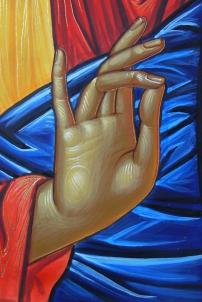 Today, the Holy Church today celebrates the new year. It does this with prayer.
Today, the Holy Church today celebrates the new year. It does this with prayer.
Who does not desire health, prosperity, peace, and a good life? All these things come from God, so He is the one we must ask for them:
O unoriginate Word and Son, Who is united with the Holy Spirit, Creator and Fashioner of all things visible and invisible: bless Thou the crown of the year, preserving the multitude of the Orthodox in peace, through the prayers of the Theotokos and of all Thy saints.
Stikhira at “Lord I have cried”.
God is, indeed, the one who gives everything to all, regardless of whether men appreciate this fact or not:
God belongs to all free beings. He is the life of all, the salvation of all - faithful and unfaithful, just and unjust, pious and impious, passionate and dispassionate, monks and seculars, wise and simple, healthy and sick, young and old — just as the diffusion of light, the sight of the sun, and the changes of the weather are for all alike; ‘for there is no respect of persons with God’.
St John Climacus: The Ladder of Divine Ascent
All men live and are warmed by rays of the spiritual Sun - God. They all enjoy various blessings, which some thank God for. Others again appear to think blessings are their “human right”. The Church teaches us that God is the source of blessings, and that He can withdraw these from us at anytime - whether due to our ingratitude, or to test us, or even to glorify us.
If all things have been made by God and for His sake, then God is better than what has been made by Him. The one who forsakes the greater and is engrossed in inferior things shows that he prefers the things made by God to God Himself.
St Maximos the Confessor: 400 Chapters on Love I:6
Therefore, the Christian must remember that spiritual blessings - faith and virtue - are higher than all earthly things. Only spiritual goods will help us unite us with the Creator, and only these blessings can last us all the way to eternal life. We reach eternal life with God by the path of Christian life in the body on earth. The Church prays that we make a new-years’ resolution to set out on the spiritual path:
O Master, God of all things, lead through this year which beginneth those who adorn themselves with divinely beautiful spiritual works, and who hymn Thee with faith.
Canon, ode 3.
O ye Orthodox people who now begin the year, let us set a beginning to our hymns to Christ Who reigneth over the everlasting Kingdom; and let us piously chant: O God of our fathers, blessed art Thou!
Canon, ode 7.
Nevertheless, the Church, our Mother, knows that Her children often go astray. She calls out to the Mother of God to help us sinners:
To the path of repentance guide us who are ever inclined toward evil and trackless places, and who anger our all-good Lord, O blessed Mary who knewest not wedlock, thou refuge of despairing men and habitation of God.
Sedalen
Through the prayers of the Most-Holy Mother of God, of St Symeon the Stylite and his mother, Martha, of the 40 women martyrs and all the Saints, may the coming year be blessed with spiritual goods for us all!
Read also the edifying spiritual periodical in English from the Convent of the Holy Angels, Greece.
Tuesday, August 19, 2014
The Holy Transfiguration of our Lord and Saviour Jesus Christ
The transformation of Christ on Mount Tabor symbolizes the spiritual transformation that is expected of each Christian soul.
This process starts at our baptism, our spiritual birth. During our time on earth, praying at Church services, participating in confession, communion and the other Sacraments - our mind and heart gradually transform. Our thinking, understanding of life, priorities and tastes gradually change; and we acquire a taste and preference for prayer, spiritual reading and contemplation whilst here on earth, in this physical world. This is the required preparation for an eternal existence in a spiritual world with God.
For when the world ends, or when our body dies, all physical reality ends and we must exist either with good spirits (angels - in Heaven) or with evil spirits (demons - in hell). For us to be continually with our transfigured Lord it is essential to come to understand the power of His Resurrection, and then freely and voluntarily take part in His sufferings and passion (Philip. 3:10).
Before the appearance of Jesus Christ, the law and the prophets served as guidelines for moral life of people. Now God Himself witnesses in the presence of Moses and Elijah - the representatives of the Law and the prophets - that the Son of God has appeared on earth in bodily form. All people who wish to receive eternal salvation must listen to Him - “Hear Him!” (Lk 9:35) - He will open to us the true meaning of Moses’ Law and the prophets; He will announce to us a new perfect teaching, fulfilling which, we will receive eternal salvation!
Therefore if we don’t like to pray, or don’t pray; if we don’t like to go to church and read spiritual books, we are not ready to be with God in Heaven. If we like worldly entertainment, shows, sports, amusements, or any other physical occupation which steals our time and energy, then how is our soul going to be ready for Heaven? In such cases when the soul leaves its dead body and confronts God, the presence of God burns it and the soul suffers agony, instead of the joy that was intended…
Tuesday, August 12, 2014
Live transmission of Divine Liturgies from Holy Archangel Michael Sobor in Odessa
Vladika Agafangel has made available live transmission of Divine Services from his cathedral in Odessa, Ukraine. This initiative gives an opportunity for us in faraway Australia to remain connected to our Bishop and his cathedral services.
The Divine services channel is updated every Church feast day
